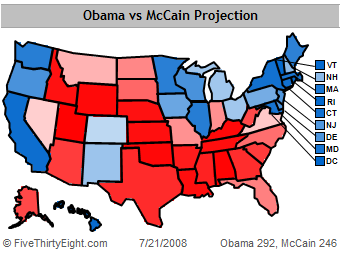Health and Party: A Study in Common Cause
A new study finds that Americans rank first in the world in terms of money spent on health care and 42nd in the world in terms of life expectancy. Not much of a bargain, huh?
Turns out, though, that there is a wide difference along geographical lines. Different states will have extremely different average life spans. Check out this map.  The darker the brown, the longer the average lifespan in the state.
The darker the brown, the longer the average lifespan in the state.
Compare that map to this one: This is Poblano's projection map of the upcoming Presidential election. With the exception of Alaska, all of the states with the longest life expectancy, those with the two darkest shades of brown are likely voting Democratic. All the states with the shortest life expectancy, with the exception of New Mexico, are likely voting Republican.
This is Poblano's projection map of the upcoming Presidential election. With the exception of Alaska, all of the states with the longest life expectancy, those with the two darkest shades of brown are likely voting Democratic. All the states with the shortest life expectancy, with the exception of New Mexico, are likely voting Republican.
Quite a striking correlation. Does this mean that Democrats live longer? Does this mean that states with better funded social programs create situations where people have greater lifespans?
As Marty Kaplan points out, it more complicated than that:
How can that be? What could possibly determine whether America is among the industrial world's healthiest nations, if not the thing we're all clamoring for: universal heath insurance? The answer -- and this isn't a political opinion, it's an epidemiological finding -- lies in the social determinants of our physical condition. Determinants like income, class, education, racism, the availability of public transportation, land-use policy, environmental policy, participation in the political process and a host of other factors that don't depend on our genetic makeup or our propensity to take personal responsibility for diet and exercise. Determinants that flow not from luck or individual choices, but from laws, regulations and priorities set at all levels of government and in the private sector as well. (If you want an alarming eyeful about this, check out the new California Newsreel documentary "Unnatural Causes.")Turns out that the idea of health really is more than just bodily functioning, but is a matter of the full lived life.
The way we currently think about health in America -- about health care, that is -- is completely understandable. We all want access to the best possible health care for our parents, our kids and ourselves, and we want it to be affordable, and we want plenty of choices. What's astonishing is that even if we covered all the uninsured's health care, we would still likely rank at the bottom of industrial countries for healthiness. The major causes of our country's healthiness or unhealthiness are all upstream of the things that send us to doctors and hospitals and pharmacies. The causes are poverty, and stress, and the amount of control and autonomy we have at our jobs, and whether there are showers there, and what they put in the vending machines. The causes are access to early childhood education, and to day care, and whether schools are built near asthma-breeding freeways. They are whether your neighborhood offers public libraries and public transportation and walking trails, or public dumps and liquor stores and fast food franchises.
Why is there a connection between voting patterns and life expectancy? Wealth, education, social infrastructure all play roles. Certainly access to good quality health care is important. A dear friend of mine is a surgeon at Johns Hopkins, the top hospital in the country, which happens to be located -- intentionally -- in a bad section of Baltimore. He tells me how the cases that come in from all over the world are exotic, tricky, the hardest most medically intricate and interesting who are sent to Hopkins. But those who come in through his emergency room are complicated also. Some he has taken bullets out of before, others with substance problems, many with nutritionally connected or tobacco related concerns, medical problems of class and race...and this is in Maryland, one of the dark brown states.
It shows how intricate social problems really are. We can't solve the crisis in health care without tackling the environment and education. The problems in our schools are connected to the problems with nutrition. These are connected to under and unemployment. These are connected to education and health to close the complex circle which closes in on itself in any number of other ways.
It turns out that the body politic is much like the body, the thigh bone is connected to the hip bone, a disease in one part will effect other parts in unexpected ways. Just as our parts are not autonomous atoms, neither are we. The live lived by everyone else does indeed effect the quality AND length of our own.






|